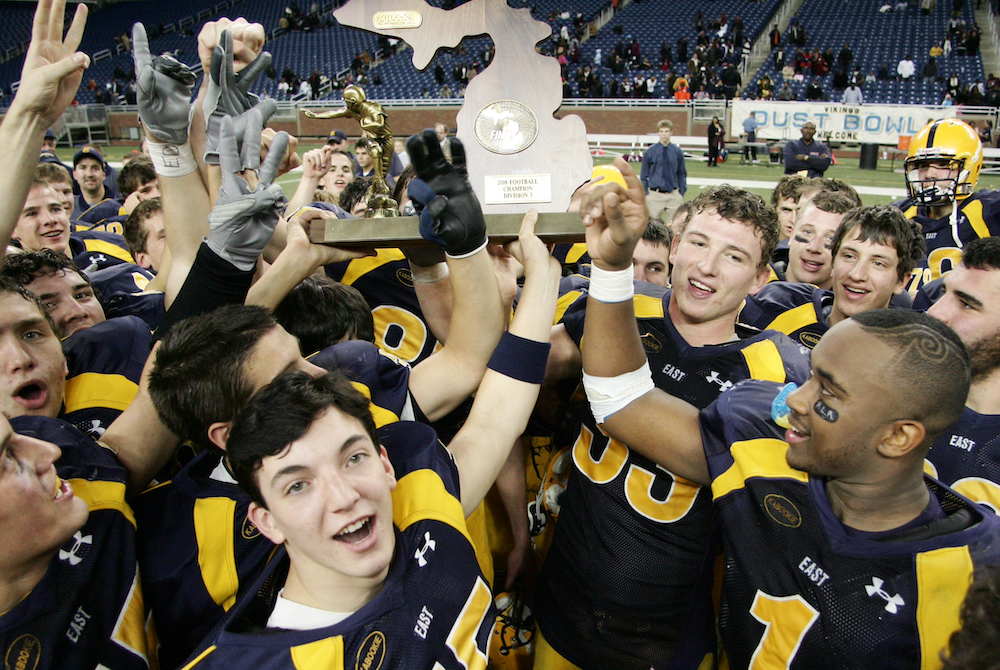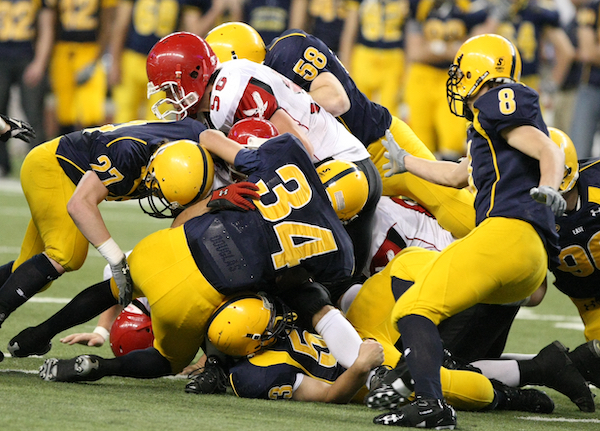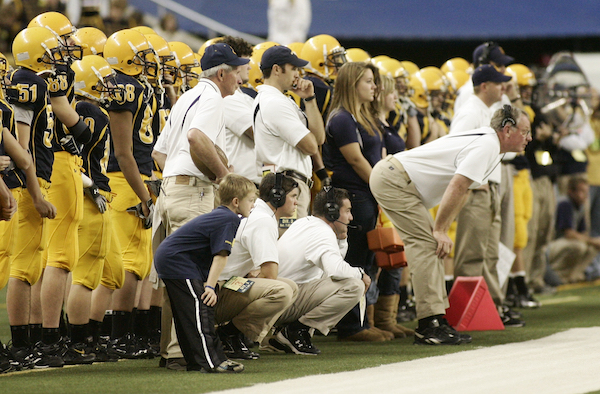
Veteran Coach Shows Wayne the Way
By
Tom Markowski
Special for Second Half
September 16, 2015
WAYNE – Donald Anderson watched the Wayne Memorial football program lose game after game after game.
As a fan of high school football and a resident of Westland, Anderson, at times, just shook his head. As a former coach, Anderson thought about the possibility of doing something about it.
 Few Class A programs have had less success than Wayne. The Zebras have made the playoffs twice and have yet to win a playoff game. Wayne’s last winning season came in 2006, when it finished 5-4. From 2010-2013, Wayne won one game. The Zebras were 2-7 last season.
Few Class A programs have had less success than Wayne. The Zebras have made the playoffs twice and have yet to win a playoff game. Wayne’s last winning season came in 2006, when it finished 5-4. From 2010-2013, Wayne won one game. The Zebras were 2-7 last season.
Wayne is a member of the Kensington Lakes Activities Association and competes in the South division with such well-respected and successful programs like Canton, Livonia Churchill and Plymouth. Even its sister school, Westland John Glenn (the schools are part of the Wayne/Westland school district), has been a playoff team on a regular basis.
As a point of fact, four members of the KLAA South (Canton, John Glenn, Livonia Franklin and Plymouth) have reached an MHSAA Final.
Wayne’s road to rise is not an easy one.
But they have begun the climb.
“We’re getting better. We moved it well against Plymouth (in a 36-13 loss last week). We just don’t have a lot of firepower," Anderson said.
“We’ve got a good young squad. We have just seven seniors, and we don’t have a JV. We have just 12 sophomores and I didn’t want to take away from our freshmen, because they’re good, and we can build on that.”
 Last April the Wayne/Westland school district had openings for a head varsity football coach, at both John Glenn and at Wayne. Anderson applied for both and was hired at Wayne. This season he became the school’s fourth head coach in as many years.
Last April the Wayne/Westland school district had openings for a head varsity football coach, at both John Glenn and at Wayne. Anderson applied for both and was hired at Wayne. This season he became the school’s fourth head coach in as many years.
Anderson, a Detroit Cody graduate and former NFL player (he was the 32nd player taken in the 1985 NFL Draft after playing four years at Purdue University), has had success as an assistant or head coach at every school he’s been at since he starting coaching in 1989.
Anderson was the defensive coordinator at Cody before becoming the head coach in 1995. In 1999, he went to Detroit Henry Ford as an assistant under Mike Marshall before going to Detroit Northwestern in 2003 as an assistant under Michael Crayton. In 2009, Anderson became the head coach at Northwestern. The school closed after the 2009-10 school year, and Anderson decided, at that time, enough was enough.
He’s been a spectator ever since. Until this season.
“I was still involved,” he said. “I was in consultations with other schools. They wanted to pick my mind. I had a lot of opportunities to coach. It wasn’t the right time. I’ve lived in Westland since 2009. I live between Wayne and Glenn, and I’ve been watching Wayne for a while. I decided to give it a shot. The subject just drew me in. When the opportunity came, I said let’s try it.”
But coaches at Wayne don’t last long. Why would a person, 52 years old and a successful businessman, take a position there when he passed up other coaching opportunities?
A big part was wanting to help local athletes pursue their dreams at the college level. But there also was the challenge.
“I like a task," Anderson said. "It’s like when I left Henry Ford and went to Northwestern. People thought I was crazy. Low and behold, look who’s on my staff.”
 Marshall is now Anderson’s assistant, as is Charles Spann, a former head coach at Detroit Chadsey and Detroit Pershing. It’s people like Marshall and Spann who waited for Anderson to get back into coaching to return to the sidelines themselves.
Marshall is now Anderson’s assistant, as is Charles Spann, a former head coach at Detroit Chadsey and Detroit Pershing. It’s people like Marshall and Spann who waited for Anderson to get back into coaching to return to the sidelines themselves.
Both Marshall and Spann won Detroit Public School League titles as head coaches. Now they’re trying to help a friend experience the same.
There are definite reasons for optimism. Anderson sees a lot of potential in 6-foot-3, 215-pound sophomore Reggie Micheaux, a receiver and defensive end. "He can go up and get it, and he's a big target," the coach said.
Running backs Jarvis Martin and Malik Bryant, the latter also a defensive back, are among others who are impressing early.
Anderson said former players like himself are different. They have their pride. Their egos push them into circumstances others wouldn’t tread.
But for Anderson, it’s more than his ego he’s trying to satisfy. Ten years ago he was diagnosed with kidney failure. He went through dialysis until he received a kidney transplant five years after the diagnosis. After two years, his new kidney failed. Anderson has received kidney dialysis, three days a week, since 2012. With all of that comes a different perspective.
The winning, for now, has had to wait. Wayne is 0-3. Still, those 13 points represented the most they’ve scored against Plymouth since 2007.
It doesn’t get any easier with Canton (3-0) next, but the Zebras will continue to build.
“It’s about passing it on,” he said. “God has been good to me. It’s about helping others.”
 Tom Markowski is a columnist and directs website coverage for the State Champs! Sports Network. He previously covered primarily high school sports for the The Detroit News from 1984-2014, focusing on the Detroit area and contributing to statewide coverage of football and basketball. Contact him at [email protected] with story ideas for Oakland, Macomb and Wayne counties.
Tom Markowski is a columnist and directs website coverage for the State Champs! Sports Network. He previously covered primarily high school sports for the The Detroit News from 1984-2014, focusing on the Detroit area and contributing to statewide coverage of football and basketball. Contact him at [email protected] with story ideas for Oakland, Macomb and Wayne counties.
PHOTOS: (Top) Malik Bryant breaks past pursuing Plymouth defenders during last week's game. (Middle) Jarvis Martin works against a Plymouth player. (Below) Kyle Brooks turns upfield. (Photos courtesy of Wayne Memorial athletic department/Kathy Hansen Photography.)

EGR 5-Year Title Run Remains Awe-Inspiring, Product of More Than Talent Alone
By
Steve Vedder
Special for MHSAA.com
November 25, 2022
It was Peter Stuursma's first year at East Grand Rapids and while the wolves weren't necessarily knocking at the door, they were definitely on the prowl.
The tradition-rich Pioneers football team had slumped to an uncharacteristic 3-6 record in Stuursma's first season as varsity head coach in 2000, and there were subtle signs a community used to winning was growing restless with the program's direction.
That's when Stuursma bumped into one of his players coming out of the weight room, and the two had a quick conversation which he clearly remembers 22 years later.
"It was this senior offensive lineman and all he said was, 'Don't worry about it Coach, it's not going to happen again. We got this,’" Stuursma said. "We had just gone 3-6, and I'm wondering how we're going to get this going and that they might get rid of me. You never underestimate what people can do."
East Grand Rapids, under legendary coach George Barcheski, had been the dominant football program in West Michigan with 28 winning seasons over 29 from 1970-99, and 38 victories in 39 games from 1993-95, along with Class B championships in 1976 and 1983. After Stuursma replaced the retiring Barcheski,, some in the community were expecting more of the same when it came to success.
Those fans never dreamed what they would see as the Pioneers promptly pieced together arguably the greatest decade-long stretch in Michigan high school football history – and without doubt one of the most incredible five-year runs of dominance.
Even that optimistic offensive lineman couldn't have imagined a remarkable 126-7 record over the next 11 years, a 40-3 MHSAA Tournament mark and seven Finals championships. Five of those titles (2006-10) came in a row, a feat accomplished just three times in the now 46-year history of the playoffs.
 The five straight championships were part of an amazing era that Stuursma and his players say has not diminished with time. They recall no single factor explained going 67-3 overall over those five seasons. There was talent, obviously, but coaching, tradition, confidence and strength of community all played vital parts. There were Thanksgiving practices attended by hundreds of former football alumni, dedicated fan support that included playing before more than 30,000 fans at least twice at Ford Field, and a program-wide attitude that, while some may call it a cliché, proved that success did indeed breed success.
The five straight championships were part of an amazing era that Stuursma and his players say has not diminished with time. They recall no single factor explained going 67-3 overall over those five seasons. There was talent, obviously, but coaching, tradition, confidence and strength of community all played vital parts. There were Thanksgiving practices attended by hundreds of former football alumni, dedicated fan support that included playing before more than 30,000 fans at least twice at Ford Field, and a program-wide attitude that, while some may call it a cliché, proved that success did indeed breed success.
"I'm in awe of the scope of things," said Stuursma, whose team used back-to-back Division 3 championships in 2002-03 as a springboard to later success. "Because we had won a couple times before it just started to feel normal. We had such support the community used to think Thanksgiving break ended at Ford Field."
EGR teams would find all kinds of ways to win during the five-year title stretch. The 2009 team, for instance, barreled through its first four playoff opponents by a combined score of 164-29 until a 24-21 win over Orchard Lake St. Mary’s in the Final. The 2010 team had to win three playoff games by eight points or fewer to finish off its perfect 14-0 record. And then there was the wild 46-39 five-overtime win over St. Mary's in the 2007 Final during which the Pioneers had to score on all five possessions in overtime to outlast the Eaglets.
While teams always seemed to find ways to get the victory, former players remember what it was like to be part of a seemingly endless tradition of success on the football field.
"One of the things that was so special about East Grand Rapids were the expectations," said Luke Glendening, a running back on the 2006 team who has gone on to a long NHL career with the Detroit Red Wings and Dallas Stars. "During the game I'd look around and see guys who had played here a long time ago. I viewed it as a privilege to have the opportunity to play before the alumni and community."
Quarterback Ryan Elble, who completed a combined 34 passes for 483 yards and seven touchdowns during the 2008 and 2009 Finals, also used the word "honored" to describe his high school experience.
"The culture was to win. Coach Stuursma made it fun, and it always seemed to take shape on the field," said Elble, who went on to play baseball at Miami (Ohio) "I think each team had different skill sets, but at the end of the day it was our culture and putting in the work to spend Thanksgiving weekend at Ford Field."
The players point to that winning culture over talent. Elble said he played with only one eventual Division I college player in linebacker/running back Trent Voss, who went on to Toledo. Nobody wins without talent, of course, but they point to many other factors as being just as critical. Because EGR coaches would always work juniors into the lineup, Stuursma said the program faced only one major rebuild, in 2007. That team wound up 13-1 and the second of those five straight champions.
 "We had some incredible players," said Stuursma, who left EGR in 2016 to lead Hope College to two Michigan Intercollegiate Athletic Association titles, three second-place finishes and a 46-15 overall record over his seven seasons. "We returned only two starters (in 2007), but we still had good guys who wanted to win."
"We had some incredible players," said Stuursma, who left EGR in 2016 to lead Hope College to two Michigan Intercollegiate Athletic Association titles, three second-place finishes and a 46-15 overall record over his seven seasons. "We returned only two starters (in 2007), but we still had good guys who wanted to win."
The players say the culture started with Barcheski and the program's tradition. As Hope College's coach, Stuursma said there’s a similar common thread among schools he sees on recruiting visits: a winning tradition that, in Stuursma's words "screams excellence," from every corner of the building. He sees it the minute he walks into some schools, and East Grand Rapids had the same culture before he arrived. The past players say it played a major part in their careers.
That tradition didn't start with the five straight titles, said former quarterback Kyle Cunningham, who played on the 2002-03 teams and went 46-0 over four years from his freshman to senior seasons. Those two championship teams’ most recognizable player was running back Kevin Grady, who still holds multiple MHSAA records including for career rush yardage and went on to play at University of Michigan.
"We worked hard and had a lot of pride," he said. "I remember watching film of earlier teams, and I remember hoping our team could stand up the same way."
While the players point to tradition and community, Ryan Blair, a tight end/defensive tackle on the 2006-08 champion clubs, said talent remained critical – but EGR was outmanned physically in some of those title games. That's when camaraderie and the confidence that someone was going to make a key play took over. The Pioneers' remarkable run was teeming with such plays.
"Certainly we were never one of the biggest teams there, we never had a big size advantage in any game," he said. "But we had this camaraderie on every team. We had guys who really liked playing with each other. When things got tight we stuck together, and we'd fight to the fourth quarter or beyond."
Despite the long odds of winning a single state title let alone repeating, Stuursma believes there could be a team one day which wins six straight. That team will have the same characteristics of those EGR teams – the talent, coaching, tradition and fortune of catching timely breaks – but it can be done, he said.
"Absolutely," Stuursma said. "The only record I can think of that won't be broken is Wayne Gretzky's (NHL) scoring record. It will take a lot, but records are made to be broken. I think high school football is on the upswing and there would have to be an emphasis on winning. You would have to have a good path to get there, but I can see someone getting six one day."
PHOTOS (Top) East Grand Rapids celebrates its third-straight Division 3 championship win in 2008. (Middle) Pioneers converge on an Orchard Lake St. Mary’s ball carrier during the 2007 five-overtime title decider. (Below) EGR coach Peter Stuursma, kneeling center, monitors the action during the 2010 championship game.

